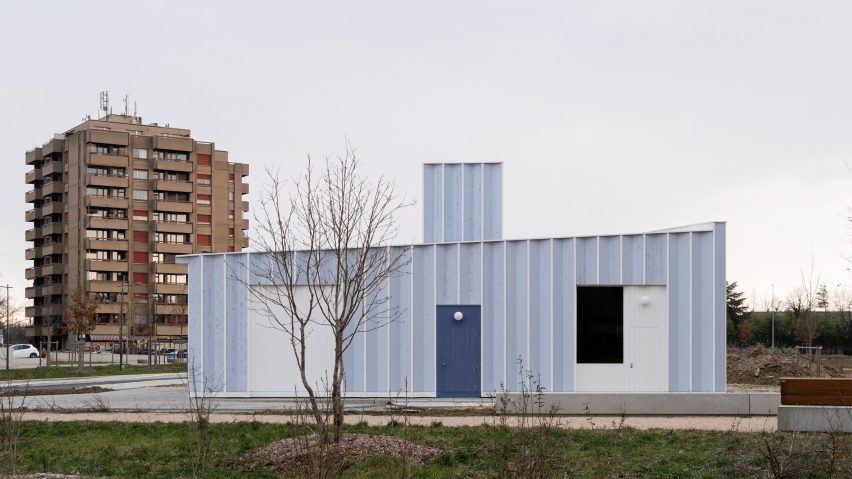Gardeners House is a blue-stained timber and terracotta-brick structure in a park in Geneva, designed by architecture studio Cabinet to provide workshops for gardeners and leisure space for locals.
Located near a forest in the municipality of Thônex, the single-storey building is topped with a spherical light in a boxy lantern, intended to help it stand out.
"Surrounded by trees, it would become invisible, but its urban position is at a strategic point at the crossroads of street and park paths, and our ambition was to make it a public building," Cabinet founders Fanny Noël and Diogo Lopes told Dezeen.
"All of this seemed like good reasons to make the building more visible and to mark its presence in the urban space."
When the lantern is turned on, it lights up the workshop interior and becomes a signal to the residents that the grounds' gardeners are working.
"By integrating a light moon that illuminates both interior and exterior, the inhabitants perceive when their gardeners are present on site, creating a dialogue between a hermetic program and the surroundings," said Noël and Lopes.
The 205-square-metre Gardeners House contains a communal kitchen, shared leisure space and toilet facilities accessed by one entrance, while another leads to two connected workshop spaces.
A central hall connects the workshops and public spaces, as well as an office and changing rooms.
"The main function of the building is a workshop for gardeners responsible for the maintenance of the park, but we suggested to the client to integrate a bigger kitchen and dining space with independent access that could be used by the inhabitants of the neighbourhood," Noël and Lopes explained.
"They welcomed this idea, and we hope that events can happen in the future as it would stimulate a closer relationship between the building and the community."
Gardeners House has a pleated exterior made from blue-stained pine. One facade features a water fountain at the centre and curves around a circle of planting.
Load-bearing terracotta-brick walls support 10-centimetre-thick concrete roof beams, which are left exposed to resemble a pergola and filter light from the skylights above.
The concrete floor slab is built over an underground electrical station, using its concrete walls as foundations to avoid extra use of concrete.
Some window openings puncture the exterior, but for the most part, blank walls were necessary for hanging tools and storing machinery and equipment.
"We thought it was important to place some windows in strategic places to provide views to the refectory and the workshop space, while the users welcomed a source of light that could illuminate the depth of the plan," said Noël and Lopes.
"We took this as an opportunity to design a pergola-like structure that would stand on top of the brick walls," they continued. "By making the beams cross under the skylights, we produce a series of shadows that evoke outdoor garden structures."
Structural materials are left exposed internally to reflect the industrious and practical function of the building, while the exterior is decorated in lightly-coloured timber with the aim of creating a visually appealing public structure.
"The building is designed in an inverse order of construction – the delicate timber cladding is placed on the outside, and the rough structure is placed on the inside," said the architects.
"This responds to the intention of being empathetic with the public space and withstand the use that takes place in the interior."
Noël and Lopes were informed by the history of groundskeeper and garden maintenance lodgings when designing the gardeners' workshop.
"We were interested in the typology of gardeners' maintenance buildings and found that, prior to industrial structures, gardeners had a house-like structure on site, with a kitchen, refectory and small office," they said.
"This ambiguity between an industrial structure and a house-like character seemed worth exploring."
Based in Geneva, Noël and Lopez founded the architecture studio Cabinet in 2019.
Other workshops that have been built in wooded areas include a timber barn-like structure built on a historic farm in Sweden and a model-making shed in Bath made from timber and corrugated fibreglass.
The photography is by Sven Högger.
Project credits:
Architects: Cabinet Fanny Noël Diogo Lopes Architectes
Civil engineer: ZS Ingénieurs Civils
M&E engineer: Amstein + Walthert Genève
Thermal engineer: Perreten et Milleret
Surveyor: Haller Wasser + Partner
Fire engineer: Zanetti Ingénieurs Conseils
Landscape architect: Oxalis Architectes Paysagistes

